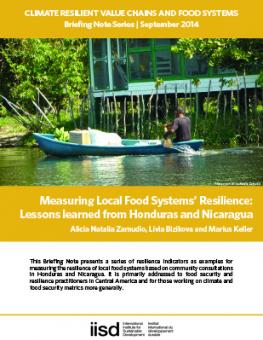
Measuring Local Food Systems’ Resilience: Lessons learned from Honduras and Nicaragua
Climate variability and change are already affecting food security of vulnerable populations.
Poor communities are particularly exposed to climate shocks, as their livelihoods are often highly climate-sensitive, and resources for coping and adapting to change are limited. Adaptation and resilience-building measures can reduce adverse impacts on food security. To do so requires an understanding of where weaknesses and strengths lie in local, regional and international food systems. In other words, what makes a food system resilient to any shocks and stresses?
This briefing note presents insights into how one can measure and monitor the resilience of food systems in order to better inform food security interventions, based on the application of a new food security and resilience assessment methodology in Honduras and Nicaragua. It also draws recommendations for future food-security assessments in the context of a changing climate by stressing the importance of adopting a systems perspective to food security to encompass the many factors determining that security beyond the farm.
Participating experts
You might also be interested in
Using Process-Based Indicators to Help Design Effective Policies on Food Security in the Context of Climate Change
FIPAT Guidebook: Food Security Indicator & Policy Analysis Tool
CRiSTAL Food Security 2.0 User's Manual. Community-based Risk Screening Tool - Adaptation and Livelihoods: Focus on Food System Resilience
Climate Resilience and Food Security: A framework for planning and monitoring
This working paper was developed jointly by all partners of the Climate Resilience and Food Security in Central America (CREFSCA) project.